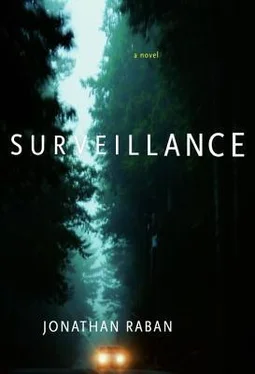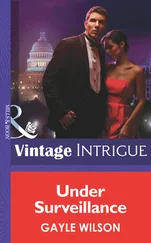Yes, she’d lied, but not only was it five in the morning, she’d lied in the service of the truth, trying to rid this unpleasant woman of a vengeful fiction that had its entire basis in a chance glimpse of a dust jacket in a bookstore. For what else was there? And Mrs. Tillman hadn’t caught her in her lie; she was merely desperate to evade the truth, which was that she was living in Fantasyland. It was written all over her letter, and palpable in her every pronouncement: the bitch was a fucking psycho.
Yet against all reason her adamantine certainty still shook Lucy, They’re forgeries! continuing to ring in her head, a measure of the power of even psychotic certainty to sway one’s feelings in spite of one’s better judgment. Spend enough time with the mad and you’ll catch their madness, because sanity is a fragile, feeble, defenseless thing when battered by the intractable, lunatic conviction exemplified by Mrs. Tillman. It was weak of Lucy to feel so shaken.
She badly wanted to drive back to Useless Bay and get Augie to show her the papers in that envelope. She thought of phoning him now; he could make photocopies in Langley, FedEx them over, and she’d have them in hand tomorrow. That’d stop Tillman’s toxic shit. But then, of course, having described them in such probably inaccurate detail, Lucy could hardly send copies to Thetford, because now they’d really look like forgeries.
Last night, she’d so looked forward to this morning, to reading through her notes and seeing how she could pull this story off elegantly, economically, in a space that GQ could print without cutting. But that phone call had blighted the day. She’d never gotten to sleep again and had squandered the next two hours rearranging the pillows to find a cool surface on which to rest her hot head. She felt jangled and hungover, though she hadn’t had so much as a sip of wine on Sunday.
She read over what she’d written yesterday. Here and there it was hard to decode her own handwriting, so fast and excitedly had she been scribbling. But overnight all excitement had leaked out of the words. What was she trying to do — reinvent New Journalism? Surely Janet Malcolm had already done this in…what was it called, The Journalist and the Murderer ? Not quite this exactly, but uncomfortably close. In her twenty-five pages, she found only four or five that still seemed workable, and they were all Augie-specific and indistinguishable from how she might have written about any other subject. She told herself she was too tired, too rattled by the madwoman, to fairly judge what she was reading, but that tomorrow she might perhaps be able to recapture the elation and ambition that yesterday had her so firmly in their grip.
Gazing dispiritedly at her notebook, Lucy thought that had Mrs. Tillman been anywhere in the vicinity, she’d willingly have slit her throat.
FINN’S VALUE seemed to have shrunk over the weekend from ten to zero. He was just another boy now, doing such Finn-ish things as covertly picking his boogers and scowling lumpishly into space. Alida, having zoomed through the page of math problems, alternated between spying on him and doodling on the piece of scrap paper covered with her calculations.
First, she drew kayaks. She was really bad at art, and Gail’s pictures put hers to shame. But her kayaks, slicing through the water, looked real enough to feed her daydreaming. Then she tried the dogfish, which were a lot more difficult, though their mean jaws, set low and far behind their long blunt noses, were easy enough; those, and their piggy little eyes. It was the rest of them that was the problem, and Alida’s dogfish repeatedly turned into ferocious goldfish. When dogfish swam close to the surface, she wondered, did their dorsal fins stick out like other sharks’?
She longed for the bell. Humanities was next, and she needed to catch Mr. Tonelli early to ask if she could do her book report on Boy 381.
She’d brought the book to school, wrapped in a plastic bag, and carefully placed atop all the other stuff in her backpack. She wanted to show Gail — and maybe Emma — the inscription.
ACT WELL, and you’d live; act ill, and you’d soon die. This was Tad’s one medical theory, to which he tried scrupulously to adhere. On visits to Brian, his doctor, he sat in the waiting room taking deep breaths, preparing to go onstage. When called, he gamboled into the examination room, not quite like a spring lamb, but at least like a man of, say, forty-five, who wasn’t HIV…His handshake was firm, his smile wide and confident, and his cheeks bore only slight, nearly invisible traces of cosmetic color to convey the impression of someone in a state of ruddy, impregnable good health.
He and Brian went through the routine: weight, blood pressure, chest and back, blood sample.
Brian went to the sink, took off his latex gloves, and washed his hands. “Stools?” he said.
“The usual. Not too light and not too dark.”
Before Michael got sick, they used to sometimes see Brian in a gay bar, now long closed, on Capitol Hill. They’d socialized a little, the three of them, talking work and politics and gossip while sizing up newcomers. Brian had a roving eye, especially for young black men. Michael had been first to go to Brian as a doctor; Tad had followed, shortly after his death. Their relationship now was mostly guarded and professional, doc and patient, though sometimes Brian still let his mask slip and became, momentarily, a friend.
Tad couldn’t quite put his finger on it, but this morning it seemed to him that Brian, too, was acting. His voice was just a little too detached, too professional, his examination a shade too perfunctory. Tad was out of the doctor’s office within fifteen minutes, armed with Brian’s usual reassurances, yet less than usually reassured by them.
Stepping onto the sidewalk, he first felt fear. Brian was holding out on him, knew something he wasn’t telling — bad news he couldn’t bring himself to deliver on this sunny but cold April morning, with the wind blowing unseasonably out of the mountains to the east. Then it occurred to him that what Brian was holding back was something about himself. Last time, he’d said cheerily, as Tad thought then, “I’ll be pushing up daisies before you do.”
What was it, cancer? Tad thought, then felt a rush of sympathy and pity. It would be even worse for a doctor; unlike Tad, Brian couldn’t believe that he might act his way out of the disease, and would review the biopsies with the same clinical absence of illusion he directed to those of his patients.
Tad next reverted to his first thought. It wasn’t Brian’s condition, but his own. He was trying to shield him from the death sentence, and perhaps would call him up later, inviting himself to a drink at Tad’s apartment in order to break the dire news to him there. He was dreading Brian’s anticipated call when he switched tack again, back to worrying about the illness Brian was so bravely trying to hide from Tad.
He wished he’d spoken up in the office. They knew each other well enough, surely, for Tad to say, “Come on, Brian, come clean with me.” But he’d been so busy maintaining his own character that any such line would’ve broken the vaudeville rules of their established double act. Now he was stuck with the worst of both worlds, fearing for both himself and Brian without knowing who, or what, or why.
Crossing Second, he ran into traffic stalled by a shoal of Humvees clad in camo netting, with troops around the Scoop Jackson Federal Building, arms at the ready. Streets were blocked off with tape and cops. Far up on Second, somebody was barking something through a megaphone, but Tad couldn’t make out the words. Just one more scare to be ignored.
Читать дальше












